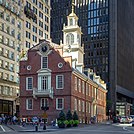Digalua
This article is incomplete because it is pending further input from participants, or it is a work-in-progress by one author. Please comment on this article's talk page to share your input, comments and questions. Note: To contribute to this article, you may need to seek help from the author(s) of this page. |
Digalua | |
|---|---|
| City of Digalua Ville de Digaluá Gaduhvi Digalua | |
Clockwise from top: Downtown skyline, National Palace, Senior Mansion House in Downtown, Talskaguah Harbor waterfront, Digalua Notre-Dame Cathedral, Old Cross Basilica | |
| Mottoes: Concordia Salus ("Well-being through harmony") | |
| Country | |
| State | Digalua Capital State |
| Settled | October 1, 1540 |
| Incorporated as town | 1677 |
| Incorporated as city | 1745 |
| Created as capital city | January 22, 1830 |
| Government | |
| • Mayor | Imlru Hoanchee-Myers |
| Area | |
| • Capital city | 304.1 km2 (117.4 sq mi) |
| Elevation | 24 m (78.4 ft) |
| Population (2019) | |
| • Capital city | 925,881 |
| • Metro | 1,729,200 |
| Demonym | Digaluan |
| Time zone | UTC-5 (EST) |
| Postal code | 5 |
| Area code(s) | 261, 493, 971 |
| Vehicle registration | D |
Digalua (Sarracese: Digaluá; Shuelah: Digalua), officially the City of Digaluá (Sarracese: Ville de Digaluá; Shuelah: Gaduhvi Digalua) is the capital city and most populous city of Chelagey. The city boasts a population of 925,881 inhabitants in 2019, making it the third-largest city in Alvinia proper after Port Alfred in Algaria and Socapatoy in Ochoccola, and covers an area of 304.1 km2 within its city limits. Founded in 1530 by Martial Milhaud during the initial colonization of modern-day Chelagey by the Sarracese colonial empire as Île-du-Roi (or "Island of the King"), Digalua has historically been the political, economic and cultural center of Chelagey as a whole, and serves as the principal nucleus of the statistical Greater Digalua metropolitan area of some 1,729,200 inhabitants. Digalua is the second-largest city in the Sarracophone world, after Toulogne.







